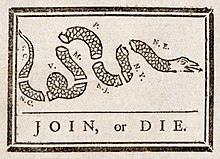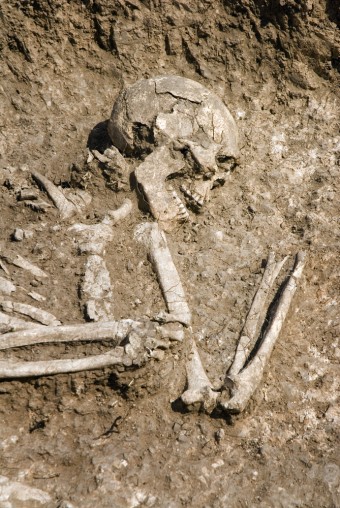If you would not be forgotten,
When you are dead and rotten,
Either write things worth the reading,
Or do things worth the writing.
Experience keeps a dear school, but fools will learn in no other.
~ Ibid., December 1743
It would be a hard government that should tax its people one-tenth part of their income.
~ Ibid.
Our Constitution is in actual operation; everything appears to promise that it will last; but in this world, nothing is certain but death and taxes.
~ Franklin (letter to M. Leroy, 1789)
Those who would give up essential liberty to purchase a little temporary safety, deserve neither liberty nor safety.
~ Franklin
 |
| Political cartoon by Franklin urged the colonies to join together during the French and Indian War |
Human felicity is produced not so much by great pieces of good fortune that seldom happen, as by little advantages that occur every day.
~ Franklin (Autobiography, Ch. 9)
I should have no objection to go over the same life from the beginning to the end: requesting only the advantage authors have, of correcting in a second edition the faults of the first.
~ Ibid., Ch. 1
_-_Benjamin_Franklin_Drawing_Electricity_from_the_Sky_-_Google_Art_Project.jpg/220px-Benjamin_West%2C_English_(born_America)_-_Benjamin_Franklin_Drawing_Electricity_from_the_Sky_-_Google_Art_Project.jpg) |
| Benjamin Franklin Drawing Electricity from the Sky c. 1816 at the Philadelphia Museum of Art, by Benjamin West |
January 17th is the anniversary of the birth of American statesman, philosopher, and scientist Benjamin Franklin (wiki) (1706-1790) in Boston. After apprenticing with his brother as a printer, Franklin settled in Philadelphia, published The Pennsylvania Gazette, and gained a wide circle of readers with his Poor Richard's Almanack (1732-1757). Entering civic affairs, he was eventually appointed Postmaster General for the colonies (1753-1774) while also dabbling in a variety of scientific pursuits, including his famous experiment with a kite in a thunderstorm.
Before the Revolution, Franklin spent a total of 14 years representing the Pennsylvania Assembly in England, attempting to achieve reconciliation with the home country. Failing that, he was elected to the Continental Congress in 1775 and signed the Declaration of Independence the next year. Appointed to represent the American colonies in France, he spent the next nine years in Paris and helped negotiate the peace with Britain in 1781. After his return to the United States, Franklin served as a member of the Constitutional Convention and died three years later. On the separation of church and state, he wrote in 1790,
"When a religion is good, I conceive it will support itself, and when it does not support itself, and God does not take care to support it so that its professors are obliged to call for help of the civil power, 'tis a sign, I apprehend, of its being a bad one."
My favorite bit of Franklin lore remains his 200+ synonyms for “drunk”, alphabetically arranged, first published in the Pennsylvania Gazette on January 6, 1737 (and later in The Drinker's Dictionary) with this introduction:
"The Phrases in this Dictionary are not (like most of our Terms of Art) borrow'd from Foreign Languages, neither are they collected from the Writings of the Learned in our own, but gather'd wholly from the modern Tavern-Conversation of Tiplers. I do not doubt but that there are many more in use; and I was even tempted to add a new one my self under the Letter B, to wit, Brutify'd: But upon Consideration, I fear'd being guilty of Injustice to the Brute Creation, if I represented Drunkenness as a beastly Vice, since, 'tis well-known, that the Brutes are in general a very sober sort of People."Here's some guy dressed as Franklin reciting the list.
And then there's... That Time They Found Those Bodies in Ben Franklin's Basement:
From 1757 to 1775, Ben Franklin lived in an elegant four-story Georgian house at No. 36 Craven Street in London during his time as an ambassador for the American colonies. In late 1998, a group calling itself Friends of Benjamin Franklin House began to convert the dilapidated building into a museum to honor Franklin, whose other home in Philadelphia had been razed in 1812 to make way for new construction (a "ghost house" frame now sits on the site).
One month into the renovations, a construction worker named Jim Field was working in the basement when he found something odd: a small pit was in a windowless basement room. Inside, sticking out of the dirt floor, was a human thigh bone.
The police were called and supervised excavation continued. More human bones were pulled up. And more. And more, until some 1,200 pieces of bone were recovered. Initial examinations revealed that the bones were the remains of 10 bodies, six of them children, and were a little more than 200 years old. Their age discouraged any interest from Scotland Yard, but piqued the curiosity of historians and the Institute of Archaeology. The bones' age meant they may have been buried in the basement around the same time that Franklin was living in the house.Read the whole thing here. More on the bodies in his basement here.
Franklin is known to have played the violin, the harp, and the guitar. He also developed the glass harmonica seen in this video:
Here's a brief (two minute) animated bio:
Wikipedia has more on his inventions and scientific studies, including (without limitation), work on electricity, ocean currents, population, the wave theory of light, and meteorology.



I have a Sad that you illustrate with the beer misquote.
ReplyDeleteFranklin wss not a mere dabbler in science. His work in electricity was foundational. Terms he invented have been used ever since.
ReplyDeleteApparently this is what Franklin actually wrote in regards to alcohol and our happiness, "Behold the rain which descends from heaven upon our vineyards, there it enters the roots of the vines, to be changed into wine, a constant proof that God loves us, and loves to see us happy."
ReplyDeleteThe first community organizer. He organized volunteer fire departments, the first US fire insurance company, militia units, the American Philosophical Society, the University of Pennsylvania, the Declaration of independence, and the Constitution.
ReplyDeleteBut note that this idea of being a "community organizer" involved actually organizing people in a community to accomplish some public good. That would be as opposed to the likes of Obama and Al Sharpton, which is about rabble rousing and grasping at political power.
DeleteThis comment has been removed by the author.
ReplyDelete